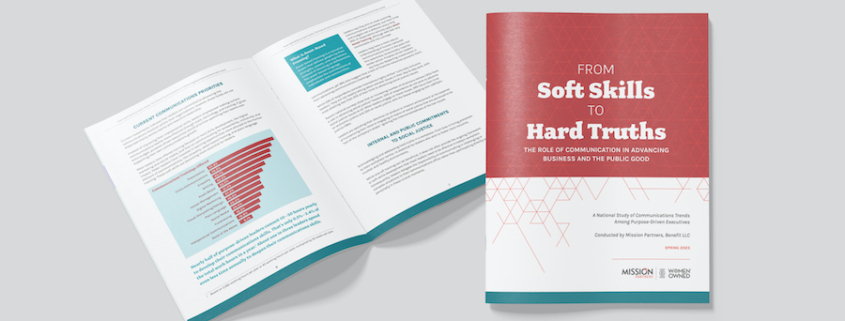New National Research Reveals Hard Truths about Soft Skills in the Workplace
As workplaces evolve to meet the needs of their stakeholders—from more inclusive policies to more holistic benefit packages—executives understand that their core skillset must evolve as well. Skills once deemed soft, such as empathy, emotional intelligence, and openness to feedback, are now the differentiating skills between good executives and great leaders.
Soft skills are essential for today’s C-suite leaders, but the hard truth is that they do not come naturally to everyone and can backfire if applied incorrectly.
To help inform the field, Mission Partners today released findings from a new national research study, From Soft Skills to Hard Truths: The Role of Communication in Advancing Business and the Public Good.
The study, conducted in 2022, includes insights from more than 800 purpose-driven leaders from across the United States, who were asked to rate their effectiveness as a communicator and as a change agent.
Findings show that the same leaders who highly value communication as a business strategy under-invest in growing their skills. And most leaders grapple with their roles as executive communicators, particularly in challenging times.
The research also revealed:
- Leaders are committed to advancing the communications function within their companies and organizations. Still, they dedicate funds to tools, technology, and hard skills–training over human-focused and personal skills development.
- Leaders understand the importance of human-centered communications, but this awareness is not always reflected in day-to-day practices and commitments.
- While leaders believe they are “very equipped” to facilitate conversations around workplace diversity, equity, inclusion, belonging, and accessibility, they struggle to connect authentically with employees during challenging moments.
Additionally, 51% of the respondents have implemented social media training and 44% implemented digital marketing training, but softer skills like empathy have not been prioritized, with only 26% of respondents having taken part in training. And 42% of the respondents commit between 10-0 hours per year to develop their communications skills, equating to less than 3% of the total work hours in a year.
Given the complexity of leading an organization in today’s society, this research is pivotal. Gaps in skillsets and the investments to uphold commitments to social justice undoubtedly influence an organizational workplace and culture. Purpose-driven leaders are essential in connecting global events and a company’s purpose, deepening the meaning that employees can find in their respective roles, which in turn can support the success of their teams, improve the culture of their organizations, and increase their impact at large.
Download and read the report to learn more, including insights into how today’s leaders can deliver on what’s needed in today’s workforce while advancing business strategies and the public good. And, if you are curious about how to navigate this at your workplace, drop us a line and we would love to chat.
Download the report at mission.partners/reports.





 Check out our new
Check out our new